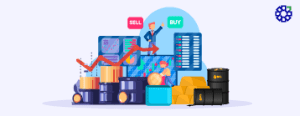Income Tax on Profit from Commodity Trading in India
- 21st August 2025
- 12:00 AM
- 6 min read
The Securities and Exchange Board of India (SEBI) has authorised over 20 exchanges for commodity trading. Investors can also trade in any number of commodities in the market. Earning profits through commodity trading is great, but not knowing the tax can hamper your investment plan.
Whether it is gold or crude oil, you have to pay taxes on profits from commodity trading. Read this blog to know more about income tax on commodity trading, speculative and non-speculative tax on income from commodities, and more.
Provisions for Income Taxes in Commodity Trading
The commodity trading income tax is classified as business income under the Indian Income Tax Act. However, the profits from commodity trading are taxable according to the applicable tax slab rates of the individuals.
There are 2 types of income in commodity trading, on which taxes will be levied. If the positions of commodity contracts are squared off without any delivery of the real commodity, it is known as speculative income. Contrarily, if the commodity is delivered and exchanged head, it will be considered as non-speculative income.
Both these incomes are considered a part of business income. However, you must know how much is speculative and non-speculative to be able to claim the actual amount of loss set off during income tax filing on commodity trading gains.
You do not have to pay capital profits tax, but you have to add all the profits to your business income and pay taxes as per your tax slab.
Speculative and Non-Speculative Tax on Income from Commodities Trading
Traders choose the type of contract that determines the applicable tax on commodity trading. Traders make two types of trades: speculative trading and non-speculative trading.
-
Speculative trading
Speculative trading is the same as day trading in the securities market. According to this trading, a trader purchases a commodity in the morning and sells it in the evening, just before the market closes. Speculative trading is cash-settled and is not delivery-based.
-
Non-Speculative Trading
Non-speculative commodity trading is the same as positional trading in the stock market. It means a trader holds the position for a minimum of one day. Non-speculative trading includes ownership transfer from one buyer to another.
In some cases, you have to pay both short-term and long-term capital gains taxes on stock trading. If you sell stock within a year of purchasing it and make a profit out of it, you must pay short-term capital gains (STCG).
However, the stock and commodity markets differ significantly. As a result, it is easy to calculate and pay taxes on profits from commodities compared to stocks. However, if you suffer losses from a declining investment, it becomes difficult to calculate the taxes.
How Can You Deduct Trading Profits and Losses from Commodity Taxes?
Income taxes only apply to profits from online commodity trading at your normal rate and not to the losses. It is crucial to know how to deduct taxes when paying taxes on commodity trading. For this, you have to calculate your net profit or loss in a financial year.
You can calculate it by subtracting your total trading losses from the total profits you have made. If you make a profit, you are liable to pay taxes according to the applicable tax rate.
On the other hand, if you incur losses, you can carry them forward to the next year and deduct them from any future profits.
You can carry forward the losses for 4 years. It starts from the financial year when you first suffered a loss. However, you cannot make up for losses in speculative trading with a steady income.
For instance, if you made INR 80,000 in non-speculative trades and INR 80,000 in speculative trades, you will be unable to claim a net profit of zero.
The reason is that you cannot maintain the balance between speculative loss and non-speculative gain. As a result, you should carry forward the speculative loss.
You can also use it to offset speculative profits in future. This can reduce the taxable amount of speculative profits.
You also have the option to deduct non-speculative losses against either non-speculative or speculative gains up to 8 years.
Tips for Effective Tax Planning for Commodity Traders
- Understand the overall tax structure before you trade commodities. Have a look at the commodity transaction tax (CTT) and the applicable income tax.
- You can make better tax planning by offsetting speculative and non-speculative profits with losses. You can carry forward speculative business losses for 4 years and on-speculative losses for 8 years.
- Hire or consult a tax expert who specialises in commodity trading. This not only helps you ensure compliance but also reduces your tax burden in numerous ways.
Final Thought
Understanding tax on commodity trading helps you make effective tax planning in commodity trading. The commodity exchange in India is subject to CTT and income tax. You have to claim these taxes under appropriate conditions.
However, if you want to start commodity trading, you can download the PL Capital Group – Prabhudas Lilladher application and open a commodity trading account. PL allows you to trade commodities with features like an advanced option chain and smart alerts.
Frequently Asked Questions
1. Is trading in commodities subject to taxes in India?
Yes, commodity trading in India is subject to both commodity transaction tax and income tax.
2. How much tax do you have to pay on trading profits?
The tax you have to pay on trading profit varies depending on each income tax slab. However, the LTCG is taxed at 12.5% and the STCG is taxed at 20%.
3. Do capital gains taxes apply to commodities?
No, you are not liable to pay capital gain tax in commodity trading, but you have to add all the profits to your business income and pay taxes as per your tax slab.





